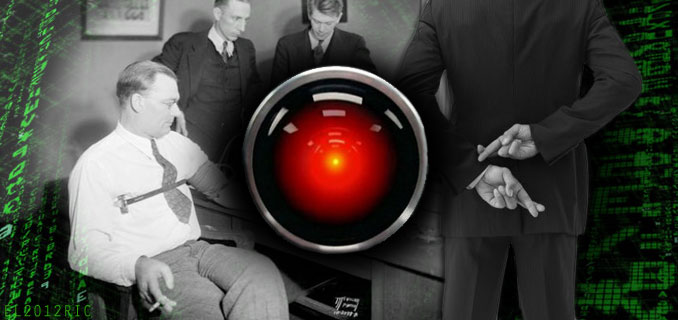Lying to people proven easier than lying to computers
Source: dvice.com

Though the world’s best poker players might claim they can call a bluff ten out of ten times, research suggested experienced investigators only get it right 65 percent of the time. So researches at the University at Buffalo, the State University of New York went ahead and wrote some software that supposedly identifies lies 82.5 percent of the time.
Most interesting thing about the software, though, was the study conducted to test it.
Forty participants were asked for a cause they strongly supported. Then, they were given the opportunity to "steal" a check written out to whatever organization opposed the one they’d chosen.
After the opportunity, they were questioned, using the software. First, they were asked simple questions to create a baseline of sorts of their eye movement, which the software analyzes.
Then, the violin-inducing climax were this a dramatic courtroom drama: they were asked if they had stolen the check.
Those who lied and got away with it received money as a reward for lying well, and the organization they had chosen also received money. Those who were caught had nearly an opposite experience: their money was given to the organization they opposed.
Interestingly moral quandary-inducing studies aside, the software has been criticized for having such a small sample size in its testing and also for not registering whole body language when seeking out liars. Though, the researchers claim they will attempt to include this in future programs as well as create faster algorithms to allow the program to work in real time.
[...]
Read the full article at: dvice.com
Image: Source - Red Stick Republican, Edited: EL RIC 2012

In-Your-Face: Can Computers Catch You Telling a Lie?
By Larry Greenemeier | ScientificAmerican.com
A popular school of thought, dramatized in the recent TV drama Lie to Me, is that a careful study of facial expressions—especially eye movements—tells investigators if a perp is dissembling. Reality is neither as dramatic nor as decisive. Even experienced investigators average only about a 65 percent success rate, according to researchers. Could computers do a better job?
Researchers at the University at Buffalo, The State University of New York (U.B.), claim their video-analysis software can analyze eye movement successfully to identify whether or not a subject is fibbing 82.5 percent of the time. The researchers, who first presented their (still unpublished) results at the 2011 IEEE International Conference on Automatic Face and Gesture Recognition a year ago, believe they have laid the foundation for a more extensive study that will include a larger sample and take into account body language in addition to eye movement to determine whether new technologies can help interrogators in their search for the truth.
The 40 interviews were conducted by Mark Frank, a U.B. professor of communication and a study co-author, and included a diversity in age, gender and ethnicity. Prior to the interview, each subject was given the opportunity to "steal" a check made out to a political party or cause that the volunteer strongly opposed. Afterward, subjects sat down with a retired law-enforcement interrogator. The interviewer first posed conversational questions unrelated to the possible theft, to establish a baseline of normal eye movement, and then asked whether the interviewee had taken the check.
Those subjects who successfully lied received a monetary reward for themselves as well as for a group they supported. Those caught lying received nothing and were told that money would instead go to the party or group they opposed. The software compared each subject’s baseline eye movement with those observed during the questions about the check. If the computer detected a large deviation, the researchers noted this change and flagged that person as a potential liar.
The work of Paul Ekman, professor emeritus of psychology at the University of California, San Francisco, School of Medicine served as an inspiration for the study. Ekman’s specialty is the study of emotions and their relation to facial expressions, and his work formed the basis of the techniques used by fictional psychologist Cal Lightman in Lie to Me. Frank performed postdoctoral research at U.C. San Francisco’s psychiatry department under Ekman’s guidance.
Ekman’s focus on brief, involuntary facial expression is not without critics. One former FBI special agent finds a fundamental flaw with the Buffalo study: "One problem with this research is its overreliance on the face as the only place to evince information from the body," says retired FBI counterintelligence special agent Joe Navarro, who spent 25 years with the bureau and was a founding member of its Behavioral Analysis Unit. "I can tell you as an investigator and somebody who’s studied this not just superficially but in depth, you have to observe the whole body; it can’t just be the face," he says, adding that a failure to take body language into consideration could lead to "an inordinate amount of false positives."
In future work, the Buffalo researchers plan to take a more holistic view of behavioral cues. "We know that the eyes give signals that lead to deception, but what about general body movements?" says Ifeoma Nwogu, study co-author and a research assistant professor in U.B.’s Center for Unified Biometrics and Sensors.
[...]
Read the full article at: scientificamerican.com






















